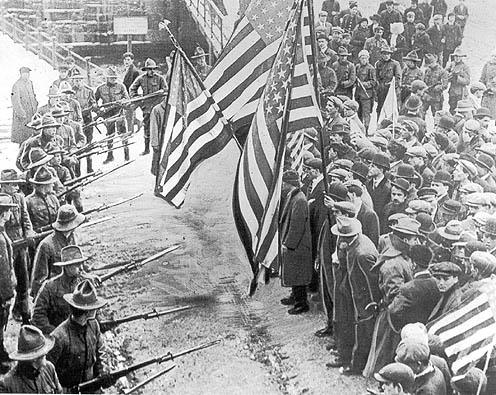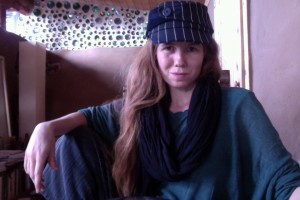
“What the woman who labors wants is the right to live, not simply exist — the right to life as the rich woman has the right to life, and the sun and music and art. You have nothing that the humblest worker has not a right to have also. The worker must have bread, but she must have roses, too. Help, you women of privilege, give her the ballot to fight with.” — Rose Schneiderman, 1912
The slogan Bread and Roses derives from a speech given by Rose Schneiderman during the “Bread and Roses” strike of 1912 in Lawrence, Massachusetts ; a line in that speech inspired the title of a poem by James Oppenheim (see below). The attribution of the phrase to the strike is probably ahistorical. Social protest novelist Upton Sinclair ascribed it to the strike in his 1915 labor anthology, The Cry for Justice: An Anthology of the Literature of Social Protest, and the mythology of girls carrying the banner “We want Bread, and Roses, too!” stuck in popular memory.
The Bread and Roses Strike involved thousands of workers, mostly women, from all the mills in Lawrence, MA, who were of fifty-one different nationalities. The strikers employed several innovative tactics. First, organizers established an efficient system of relief committees, soup kitchens, and food distribution stations, while volunteer doctors provided medical care. Second, the IWW raised funds nationwide to support the strikers and sent the strikers’ children to sympathetic homes throughout New England. This tactic alarmed the mill owners, who tried to prevent another hundred children from going to Philadelphia on February 24th. When police began clubbing women and children at the train station in full view of reporters, the strike rose to national attention, triggering a well-known dynamic in nonviolent resistance in which the use of violent repression backfires on those who use it.
On March 12th, after months of being on strike, the American Woolen Company agreed to most of the demands. The workers won pay increases, time-and-a-quarter pay for overtime, and a promise of no discrimination against strikers. Other mill owners throughout New England also raised their pay standards and conditions, anxious to avoid similar confrontations and organized resistance.
Bread and Roses by James Oppenheim
As we come marching, marching in the beauty of the day,
A million darkened kitchens, a thousand mill lofts gray,
Are touched with all the radiance that a sudden sun discloses,
For the people hear us singing: “Bread and roses! Bread and roses!”
As we come marching, marching, we battle too for men,
For they are women’s children, and we mother them again.
Our lives shall not be sweated from birth until life closes;
Hearts starve as well as bodies; give us bread, but give us roses!
As we come marching, marching, unnumbered women dead
Go crying through our singing their ancient cry for bread.
Small art and love and beauty their drudging spirits knew.
Yes, it is bread we fight for — but we fight for roses, too!
As we come marching, marching, we bring the greater days.
The rising of the women means the rising of the race.
No more the drudge and idler — ten that toil where one reposes,
But a sharing of life’s glories: Bread and roses! Bread and roses!
James Oppenheim -1911 (Public Domain)
This article is from Rivera Sun’s book of nonviolent histories that have made our world. Click here for more information.
______________________________________

Rivera Sun is a change-maker, a cultural creative, a protest novelist, and an advocate for nonviolence and social justice. She’s a love-based revolutionary and the author of The Dandelion Insurrection, The Way Between and ten other fiction, non-fiction and poetry books. Her essays and writings are syndicated by Peace Voice, and have appeared in over a hundred journals nationwide. Rivera Sun speaks and facilitates workshops in strategy for nonviolent change across the country and around the world. She connects the dots between the issues, shares solutionary ideas, and inspires people to step up to the challenge of being a part of the story of change in our times. www.riverasun.com
Photo Credit: “1912 Lawrence Textile Strike 1”. Licensed under Public Domain via Commons – https://commons.wikimedia.org/wiki/File:1912_Lawrence_Textile_Strike_1.jpg#/media/File:1912_Lawrence_Textile_Strike_1.jpg